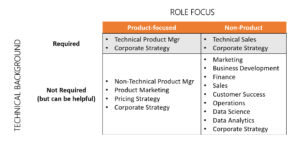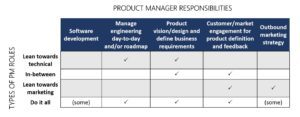More MBAs are entering the tech industry than ever before. Some of this is due to the consistent growth of “traditional” tech. However, much of this growth comes from companies in other industries going through their own digital transformations. When you look at the financial world or the automotive industry, for example, you see shifts that have been underway for a decade (or more), which has led to more tech-focused MBA hiring over the last five-plus years.
With so many MBAs entering the space — oftentimes without a technical or even tech-company background — you may be one of those candidates suddenly asking yourself, “Where do I fit in?” To help you answer this question, let’s start by addressing a couple of the biggest misconceptions about the roles of MBAs in tech.
Misconception No. 1: At a tech-focused company, I must have a technical (e.g. computer science, engineering, information systems) background.
It can be intimidating to enter the tech industry for the first time without a technical background. It can often seem like everyone around you already knows so much about the space they’re working in and they have spent years immersed in it. That said, while technical backgrounds can certainly be helpful in many roles at tech companies, they’re only consistently required in a couple of areas. I captured some of the most common categories of roles below to help highlight this distinction:

One important caveat with the list above: There’s a level of discretion required around the type of product you’re working on. Extremely technical products are more likely to have leadership that gives a leg-up to someone with a technical background across most roles.
Additionally, not all of these roles will exist at all companies, so it’s important to understand not only the title of the role you’re applying for, but also the true responsibilities and structure of the broader company or group. For example, if you apply to a sales role at a company that doesn’t have any technical sales roles, there may be an assumption that you’re able to understand the details of technical implementation. At the very least, that would be a question worth asking someone at the company as you go through your networking process.
The role definition exploration becomes especially important if you’re considering product manager roles, which leads to …
Misconception #2: “Product manager” means the same thing at tech companies (or even across similar-sized tech companies)
“Product manager” is one of the most nebulous titles at tech companies. However, the perceived high-impact and strategic nature of the role often draws MBAs in, so it’s important to highlight the variety of possible meanings this title can have.
Product management often involves understanding market needs, defining the vision for a product, helping an engineering team understand that vision, and then connecting with customers to understand product feedback and iterate. However, saying this is all or always what the role entails is an oversimplification. Product management roles typically entail collaboration and customer focus, but this can take a variety of forms.
Here are at least three other versions of product manager roles (often with the same title) that vary from the above definition (labeled “In-between”):

As you can see, the variance between these roles can be drastic, and each type of “PM” requires a different background, skillset, and interest. Given how time-consuming the job application process can be — and how often written job descriptions are different from the nuances of the actual roles — it behooves you to do your homework to understand a company’s structure and expectations before going through the entire process.
Hopefully, with these data points, you feel more prepared to enter or transition within the tech industry as an MBA. If you could benefit from further guidance, thoughts, or career coaching, we would be happy to help! Please contact ACS to make an appointment.





